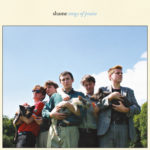Shame, Songs of Praise

Well, damn. If you asked me to paint a picture of the quintessential band of modern-day, London-bred punks, I don’t think I could do much better than actual South Londoners Shame. They’re young, raw, and unapologetically in-your-face, with lyrics that both want a fight and to just say “ah, fuck off” at the same time, vocals that are less sung than shouted, muttered, or snarled, an eyes-wide-open sociopolitical consciousness, schoolboy ties and short haircuts and suit jackets over t-shirts, and an overall vibe that simultaneously demands your attention and doesn’t give a shit if you give it.
The trick, though, is that they’re not a punk band, not really; at least, not what you’d immediately think of as a punk band. Sure, it’s in there, especially later-school post-punk like Wire and The Fall and pretty much anything on Rough Trade, but that jagged, urban sneer is counterbalanced by other sounds, too, like some off-kilter New Romanticism in the melodic guitars, a distinctly New Wave flavor to the rhythms, and ’90s post-hardcore in the delivery and vocals.
Songs of Praise starts and ends with a pair of oddball tracks for the band, generally speaking. The first song is “Dust On Trial,” all dark, sharp edges and churning, writing guitars while singer Charlie Steen howls and growls like Ian MacKaye over the top. It’s Fugazi at times and Mission of Burma at others, with a sheen of Reigns-esque dark atmospherics all over everything. The closer, then, is drone-rock track “Angie,” which I swear to God could be an obscure Verve B-side you’ve never heard; it’s pretty and anthemic in a way most of Songs isn’t, and it’s damn good, besides.
They show more of their true colors on “Concrete,” however, which is gritty and city-sounding like the best tracks Mark E. Smith ever wrote but retro and ’80s-ish st the same time. Later on in the album comes “Tasteless,” which to me lives in the same general neighborhood, with its driving, driving beat and Steen’s relentless vocals. Then there’s the skronking, messy, just-barely-holding-together swirl of “Donk” and the Subways-tinged roar of “Gold Hole,” both of which drag along with ’em this great, great feeling of menace and disillusionment.
The album shifts gears for “Friction,” the back-and-forth seesaw rhythm of which makes me think of nothing more than The Stone Roses, and “The Lick” goes further into the weird side of things, with Steen muttering and grumbling nonsensical shit over a lugubrious rhythm and keening guitars, only occasionally popping up briefly to make any kind of sense.
There’s also “Lampoon,” which barrels along full-tilt with speeding drums and a time-ticking-down bassline, guitars stabbing in and out alongside the non-stop vocals — seriously, it barely seems like Steen’s able to take a breath through most of the song. It’s possibly the most overtly “punk” thing here, but even then, I find myself thinking of Bono from U2 when it comes to the vocals (a fact I’d be willing to bet would get me punched in the face, were I to say it directly to the band themselves).
Shame, as a band, seems to not truly know how to deal with the world, even while they’re living in it. There’s a lot of uncertainty and anger here, vitriol even when the moment’s sweet, like on the jangly, surprisingly sweet “One Rizla,” where Steen declares/asks, “My nails ain’t manicured / My voice ain’t the best you’ve heard / And you can choose to hate my words / But do I give a fuck?”, over a haze of dreampop-esque guitars.
And that, right there, is what truly makes these guys a punk band. That uncertainty, that need to figure things out while wanting it all to go away, that urge to kick against the institutions that surround us, whether its the government, the patriarchy, or the music industry, that is what makes me put these guys up there with people like The Fall or Mission of Burma, icons of post-punk fury and rebellion.
Punk is about fighting against it all, even if it’s a fight against something you don’t fully understand or that you know you’ll never win, not really; it’s the fight itself that counts.



Leave a Reply